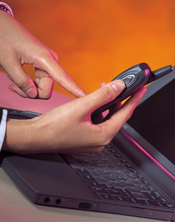Mobile technology is developing, enabling us to do ever more with our mobile devices. The capabilities of mobile technology – particularly smartphones – in the access control sector are discussed by Matthew Grimley of the British Security Industry Association (BSIA).
Smartphones have become an integral part of everyday life for most UK citizens. In fact, according to audit firm Deloitte, more than two in three UK adults – about 35 million – now own a smartphone. The technology held within smartphones is also developing at an astonishing rate. Compared to the technology available, say five years ago, the capabilities of mobile phones is almost unrecognisable. It would have been hard to imagine five years ago that most smartphones available today would have built-in fingerprint scanners and Near Field Communication (NFC). The rapid advance has revolutionised the way that we use mobile phones, they are now no longer simply for making voice calls, they can be used to make payments, browse the internet and control our home appliances. More recently, the use of smartphones as an identifier for access control systems has become a topic of great interest in the private security industry.
Paul Adams, Head of Technology and Product Management at Kaba Ltd, is chairman of the BSIA’s Access and Asset Protection Section. He believes that the technology is well suited to access control systems and has seen an appetite for these solutions in a number of sectors. He says: “Certainly the use of smartphones as an identifier is going to be hugely beneficial in the hotel industry. Most of the major hotel chains operating in the UK have shown an appetite for using mobile technology in this way and there are a number of pilot sites around the country. Hotels have shown an interest in using customers’ smartphones as the key for bedrooms which has a number of really unique benefits. Customers can make a booking online, download an app – which links into a hotel’s loyalty scheme – automatically check in and then lock and unlock their room over the duration of their stay with just their smartphone. The ease of use and the ability to link an app to a hotel’s loyalty scheme will yield an impressive return on investment.”
Typically, the sites that trial access control systems that use smartphones are making use of Bluetooth Low Energy (BLE) as it is more readily available in a range of smartphones. Paul Adams adds: “Another sector where mobile access control will be particularly useful for is within the utilities sector where there may be engineers or technicians that need access to a large number of remote sites. Currently, those engineers may need to use a master key – which can be dangerous – or collect keys from a headquarters which is inefficient. With a smartphone, access credentials to the required site can be sent to the phone directly, time restricted for security and data can be fed back to record information such as engineer time in and out. The uptake has been slower in the main access control market, however I’m fairly confident that this time next year, all of the major hotel chains will have some hotels that are making use of smartphones to manage access. Within the next five years, it will probably be the norm that most access control identification will be by smartphone, other mobile device or wearable technology.”
Visit: www.bsia.co.uk.









